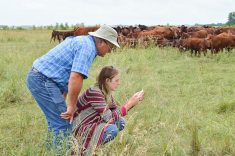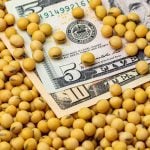Al Mussell and Ted Bilyea with the Ontario-based Agri-Food Economic Systems have presented agricultural policymakers with what could be described as a “moonshot” challenge.
A policy paper released by these two well-respected agricultural economists warns that China’s pursuit of anti-dumping sanctions against Canadian canola is a sign of more to come. Agricultural commodities are getting caught up in the geopolitics now compromising rules-based trading systems.
Food has become the weapon of choice for protesting another sdo with the alleged transgression.
Read Also

Bug farming has a scaling problem
Why hasn’t bug farming scaled despite huge investment and subsidies? A look at the technical, cost and market realities behind its struggle.
“There is a pattern of agri-food becoming the go-to target for trade retaliation, and for political tensions spilling over into agri-food trade,” the two wrote.
While China’s investigation into whether Canada is unfairly subsidizing its canola seed exports wasn’t directly linked to Canada’s decision to impose prohibitive tariffs on imported Chinese electric vehicles, few believe it was coincidental.
Here’s where the moonshot comes in.
“Canada needs a rapid pivot to anticipate a future of adverse effects from large countries’ industrial policies, and a less friendly international trade environment not readily contained by the rules-based system,” Mussell said in a release. “But Canada still needs the rules-based system that shields smaller economies from geopolitical intimidation.”
“We need a mixed strategy — with our own industrial policies, new trade alliances, but also supporting the system of trade rules we have now. Canadian agri-food policy needs to align with this — it represents a big shift.”
In other words, countries with smaller populations, such as Canada, whose economies rely heavily on exports, can’t afford to abandon the pursuit of rules-based trading if they are to thrive in the global marketplace, but they also need to start planning for those systems to fail.
That’s a tall order. I’m still hung up on the phrase “needs a rapid pivot,” which is laughable in the context of Canada’s agricultural and trade strategy development.
Canadian agriculture is a shared responsibility. Most policy pivots require co-operation from the federal, provincial and territorial governments. Even in the best of times, it can take decades to develop policy that fundamentally changes the industry’s course.
These are not the best of times. Canada’s largest trading partner is amid a presidential election campaign that will set the diplomatic tone for the next four years. U.S. trade policy has shifted toward bilateral plays and investments designed to support domestic priorities, such as protecting workers, addressing climate change and reducing reliance on exports.
Canada’s minority Liberal government could lose a non-confidence vote at any time, throwing this country into election mode. If history is any indication, agriculture ranks low on the political priority list when it comes to winning Canadian hearts and votes.
Just because it’s a long shot though, doesn’t mean pursuing a more diversified strategy is an unworthy goal. The stakes are high for Canadian farmers.
“Canada is one of only a handful of countries heavily leveraged toward agri-food net export and operating at significant scale,” the paper says.
That makes our producers vulnerable to lost returns if market access is disrupted. These actions also tend to artificially influence competitiveness. Plus, losing access to export markets has the effect of “softening up” Canadian agribusiness companies, making them ripe for foreign takeovers. Recent examples of that phenomenon abound.
So, what is Canada to do?
Align more closely with the U.S.? That food market is relatively mature compared to developing economies, so demand growth would stagnate.
The economists stressed how urgent it is for us to get ahead of the oncoming freight train, but they stopped short of offering solutions.
It leaves me wondering whether the rising tide against immigration in this country needs a reality check. Issues such as housing, after all, are surmountable challenges.
Canadian farmers are good at producing commodities that feed people. Our future food security, as well as our national security, benefits from feeding those people closer to home.
















